Mathematics for the adventurous self-learner
冒险自学者的数学
For over six years now, I've been studying mathematics on my own in my spare time - working my way through books, exercises, and online courses. In this post I'll share what books and resources I've worked through and recommend and also tips for anyone who wants to go on a similar adventure.
六年多来,我一直在业余时间自学数学——通过阅读书籍、练习和在线课程来学习。在这篇文章中,我将与大家分享我所阅读的书籍和资源,并推荐给那些想要进行类似冒险的人。
Self-studying mathematics is hard - it's an emotional journey as much as an intellectual one and it's the kind of journey I imagine many people start but then drop off after a few months. So I also share (at the end) the practices and mindset that have for me allowed this hobby to continue through the inevitable ups and downs of life (raising two young boys, working at a startup, and moving states!)
自学数学很难——它既是一次智力之旅,也是一次情感之旅。我想许多人都是这样开始数学之旅的,但几个月后就会放弃。因此,我也分享(在最后)的做法和心态,让我的爱好继续通过不可避免的起伏的生活(养育两个年轻的男孩,在创业公司工作,和移动的国家!)
How it all began for me
这一切是怎么开始的
I used to love mathematics. Though I ended up getting an engineering degree and my career is in software development, I had initially wanted to study maths at university. But the reality is, that's a very tough road to take in life - the academic world is, generally speaking, a quite tortuous path with low pay, long hours, and rife with burnout. So I took the more pragmatic path and as the years went by never really found the time to reconnect with math. That was until about six years ago when I came across Robert Ghrist's online course Calculus: Single Variable (at the time I took it, it was just a Coursera course but now it's freely available on YouTube). Roughly 12 weeks and many filled notebooks later, I had reignited my interest in math and felt energized and excited.
我以前很喜欢数学。虽然我最终获得了工程学位,我的职业是软件开发,我最初想在大学学习数学。但现实是,这是一条非常艰难的生活道路-学术界,一般来说,是一个相当曲折的道路,低收入,长时间,充满了倦怠。所以我选择了更务实的方式,随着时间的推移,我再也没有时间重新学习数学了。直到大约六年前,我偶然发现了罗伯特•格里斯特(Robert Ghrist)的在线课程《微积分: 单变量》(Calculus: Single Variable)(我上课时,它只是一门 Coursera 课程,但现在它可以在 YouTube 上免费获得)。大约12个星期后,许多笔记本被填满,我重新燃起了对数学的兴趣,感到精力充沛和兴奋。
Robert, if you read this: thanks for being such an inspiring teacher.
Why learn mathematics?
为什么要学数学?
Growing up I always loved puzzles and problem solving. I would spend hours working my way through puzzle books, solving riddles, and generally latching on to anything that gives you that little dopamine hit.
从小到大,我一直喜欢解谜和解决问题。我会花好几个小时研究解谜书,解谜语,通常抓住任何能让你产生多巴胺的东西。
If you're similar, mathematics might just be for you. Mathematics is hard. Seriously hard. And then suddenly, what was hard is easy, trivial, and you continue your ascent on to the next hard problem. It deeply rewards patience, persistence, and creativity and is a highly engaging activity - it's just you quietly working away, breaking down seemingly impossible problems and making them possible. I can't say enough how deeply satisfying and personally enriching it is to make the impossible, possible through your own hard work and ingenuity.
如果你们相似的话,数学可能就是为你们量身定做的。数学很难。非常用力。然后突然之间,困难变得简单,微不足道,你继续向下一个困难问题攀升。它深深地奖励耐心,坚持和创造力,是一个高度参与的活动-它只是你安静地工作,打破似乎不可能的问题,使他们成为可能。通过自己的辛勤工作和独创性,让不可能成为可能,这种满足感和个人丰富感是多么强烈啊。
One thing many people don't know as well is that the mathematics you learn at most high schools is actually quite different from what you're exposed to at the university level. The focus turns from being about rote computation to logic, deduction, and reasoning. A great quote I read once is that for most of us, when we learn mathematics at school, we learn how to play a couple of notes on a piano. But at university, we learn how to write and play music.
许多人不知道的一件事是,你在大多数高中学习的数学实际上与你在大学所接触的数学是完全不同的。焦点从死记硬背的计算转向逻辑、演绎和推理。我曾经读过的一句名言是,对我们大多数人来说,当我们在学校学习数学时,我们学会了如何在钢琴上弹奏几个音符。但是在大学里,我们学习如何写作和演奏音乐。
Picking the right books and courses for self-learning
选择适合自学的书籍和课程
As a self-learner, it's critical to pick books with exercises and solutions. At some point later on you can swap to books without exercises and/or solutions, but in the beginning you need that feedback to be able to learn from your mistakes and move forward when you're stuck.
作为一个自学者,挑选带有练习和解决方案的书籍是至关重要的。在某些时候,你可以换到没有练习和/或解决方案的书,但是在开始的时候,你需要这些反馈能够从你的错误中吸取教训,并且在你陷入困境的时候继续前进。
The books you pick as a self-learner are also sometimes different from what you would work use if you were engaged in full-time study at a university. Personally, I lean more towards books with better exposition, motivation, and examples. In a university setting, lecturers can provide that exposition and complement missing parts of books they assign for courses, but when you're on your own those missing bits can be critical to understanding.
作为一个自学者,你选择的书籍有时也不同于你在大学全日制学习时工作使用的书籍。就个人而言,我更倾向于有更好的解释、动机和例子的书。在大学环境中,讲师可以提供这种说明,并补充他们为课程布置的书籍中缺失的部分,但当你独自一人时,这些缺失的部分对于理解可能是至关重要的。
I recommend avoiding the Kindle copies of most books and always opting for print. Very few math books have converted to digital formats well and so typically contain many formatting and display errors. Incidentally, this is often the main source for bad reviews of some excellent books on Amazon.
我建议大多数书不要使用 Kindle,而是选择纸质书。很少有数学书能很好地转换成数字格式,因此通常包含许多格式和显示错误。顺便说一句,这通常是亚马逊上一些优秀书籍的差评的主要来源。
I'd be remiss as well if I didn't mention the publisher Dover. Dover is a well known publisher in the math community, often publishing older books at fantastically low prices. Some of the Dover books are absolutely brilliant classics - I own many and have made sure to make note of them in my recommendations below. If you don't have a big budget for learning, go for the Dover books first.
如果我没有提到多佛的出版商,我也会失职。多佛尔是数学界著名的出版商,经常以极低的价格出版旧书。多佛的一些书籍绝对是杰出的经典——我拥有许多,并确保在下面的推荐中注意到它们。如果你没有大量的学习预算,先去看看多佛的书吧。
In several places I also recommend courses from MIT OpenCourseware. These courses are completely free and often have full recorded video lectures, exam papers with solutions, etc. If you like learning by video instruction and find at various points that you're getting a bit lost in a book, try looking up an appropriate course on MIT OpenCourseware and seeing if that helps get you unstuck.
在一些地方,我也推荐 MIT开放课程的课程。这些课程是完全免费的,通常有完整的录像讲座,考试试卷和解决方案等。如果你喜欢通过视频教学,并且在不同的地方发现你有点迷失在一本书中,试着查找一个合适的关于 MIT开放课程的课程,看看它是否能帮助你摆脱困境。
Pretty much all my books I recommend below focus on undergraduate level math, with an emphasis on pure vs applied. That's just because that's the level that I'm at and also the kind of maths I like the most!
我在下面推荐的几乎所有书籍都集中在大学生水平的数学上,重点是纯粹的和应用的。这只是因为这是我的水平,也是我最喜欢的数学类型!
And also, just a final note that the order of books I recommend below is not exactly the order I worked through them - rather, it's the order I think they should be worked through. Sometimes I picked up a book that was too hard and had to double back and wait until I was ready. And some books have only just come out recently as well (eg. Ivan Savov's "No BS" books) so weren't available to me when I was at that stage of learning. In short, you get to benefit from my hindsight and missteps along the way.
还有,最后要注意的是,我在下面推荐的书籍顺序并不完全是我通过他们工作的顺序,而是我认为他们应该通过工作的顺序。有时我拿起一本太难的书,不得不原路返回等待,直到我准备好。而且有些书也是最近才出版的(例如。伊万•萨沃夫(Ivan Savov)的《没有胡说八道》(No BS)一书) ,所以当我处于那个学习阶段时,并不适合我。简而言之,你可以从我的事后诸葛亮和一路上的失误中获益。
Alright, let's jump in to the recommendations!
好了,让我们开始推荐吧!
Foundations
地基
I'm going to assume a high-school level of maths is where you last left-off and that it's been some time since then that you've last done any maths. To get going, there's a couple of books I recommend:
我假设高中的数学水平是你上次停下来的地方,而且从那以后你已经有一段时间没有做过任何数学了。为了继续下去,我推荐几本书:
The Art of Problem Solving, Vol 1 & 2 (with solutions manuals) - Lehoczky and Rusczyk
问题解决的艺术,卷1和2(解决方案手册)-Lehoczky 和 Rusczyk
The Art of Problem Solving books are wonderful starter books. They're oriented heavily towards exercises and problem solving and are fantastic books to get you off to a start actually doing maths and also doing it in a way that's not just repetitive and boring. Depending on your level of mathematical maturity, you may only want to work through volume 1 and come back to volume 2 after you've worked through a proofs book first though (the second volume has many more questions involving writing proofs which you may not yet be comfortable enough to do at this stage). Volume 2 has many excellent exercises though, so don't skip it!
解决问题的艺术书籍是很好的入门书籍。它们主要用于练习和解决问题,是很棒的书,可以让你开始真正做数学,而且不仅仅是重复和枯燥。根据你数学成熟程度的不同,你可能只想看完第一卷,然后在第一次看完一本证明书之后再回到第二卷(第二卷有很多关于写证明的问题,在这个阶段你可能还不够舒服)。第2卷有很多优秀的练习,所以不要跳过它!
No bullshit guide to math and physics - Savov
没有扯淡的数学和物理指南-萨沃夫
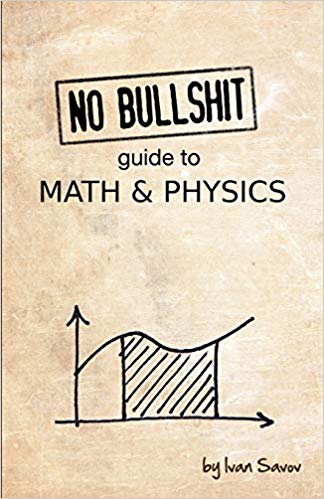
If your calculus is a little rusty or you never really understood it in high-school, I recommend working through this book. It's compact, free of long-winded explanations, and contains lots of exercises (with solutions). This book teaches calculus in a contextually motivated way by teaching it alongside mechanics, which is how I think calculus should always be taught initially (I almost recommended Kline's Calculus: An Intuitive and Physical Approach here instead, as a book I also very much like, but Kline's book is just so thick and verbose. If you do like that additional exposition, you may want to consider this book as an alternative).
如果你的微积分有点生疏,或者你在高中从来没有真正理解过它,我建议你通读这本书。它结构紧凑,没有冗长的解释,并且包含大量的练习(带有解决方案)。这本书通过与力学一起教微积分,以一种情境激发的方式教微积分,这也是我认为微积分最初应该教的方式(我几乎推荐了克莱恩的《微积分: 一种直观和物理的方法》 ,作为一本我也非常喜欢的书,但克莱恩的书实在是太厚和冗长了。如果你确实喜欢那个额外的说明,你可以考虑这本书作为一个替代)。
Also, of course I must mention the course that started it all for me, Calculus: Single Variable. It appears Coursera has now broken the course up into several parts and as I mentioned you can also find the full lessons on YouTube. Work through either this or Savov's book - depending on whether you prefer learning from books or online courses.
另外,当然我必须提到的课程,开始了我的一切,微积分: 单变量。看起来 Coursera 现在已经把课程分成了几个部分,正如我提到的,你也可以在 YouTube 上找到完整的课程。通读这本书或萨沃夫的书——这取决于你喜欢从书中学习还是从网络课程中学习。
A historical (and motivated) perspective
一个历史的(和动机的)视角
I think it's useful early on in the learning journey to have a broad map of where math has been, what has motivated its development to date, and also where it's going.
我认为在学习旅程的早期,有一个广泛的地图,包括数学的发展历程,到目前为止是什么推动了数学的发展,以及数学的发展方向,是很有用的。
Mathematics for the Nonmathematician (Dover) - Kline
非数学家的数学(多佛)-克莱恩
For a historical view, I highly recommend reading through Kline's Mathematics for the Nonmathematician. It contains a small handful of exercises, but they're not the main focus - this is one of the few math books I recommend that you can just leisurely read.
从历史的角度来看,我强烈推荐阅读克莱恩的《非数学家的数学》。它包含了一小部分练习题,但它们并不是主要的重点——这是我推荐的少数几本你可以随意阅读的数学书籍之一。
Concepts of Modern Mathematics (Dover) - Stewart
现代数学概念(多佛)-斯图尔特
While Kline provides the historical perspective, Stewart will provide you with the modern perspective. This is one of the first math books I read that genuinely made me excited and deeply want to understand topology - up until then, I was only somewhat dimly aware of the subject and thought it was a bit silly. Like the Kline book, this book also has no exercises - but for me it was a springboard and motivator to open other related books and dig in and do some hands-on math.
虽然克莱恩提供了历史的观点,斯图尔特将为您提供现代的观点。这是我读过的第一本真正让我兴奋的数学书籍之一,它让我深深地想要理解拓扑学——在那之前,我只是对这个主题有些模糊的认识,并且认为它有点愚蠢。和克莱恩的书一样,这本书也没有练习——但对我来说,它是一个跳板,也是打开其他相关书籍,深入研究和做一些实际数学的动力。
Mathematics and Its History - Stillwell
数学及其历史-史迪威

I consider Mathematics and Its History to be somewhat optional at this point, but I want to mention it because it's so darn good. If you read through Kline's and Stewart's books and thought "You know what, these ideas are really nice but I'd love to go more hands-on with them with some exercises" then this book is for you. Want to try to do some gentle introductory exercises from fields like noneuclidean geometry, group theory, and topology, not just idly read about them? This book might be for you.
我认为数学及其历史在这一点上是可有可无的,但我想提到它,因为它是如此的好。如果你通读了克莱恩和斯图尔特的书,并且认为“你知道吗,这些想法真的很不错,但是我想通过一些练习更多地实践它们”,那么这本书就是为你准备的。想要尝试做一些温和的介绍性练习,如非欧几里德几何,群论和拓扑学,而不仅仅是阅读它们?这本书可能是给你的。
BBC's A Brief History of Mathematics (Podcast) - du Sautoy
英国广播公司数学简史(播客)-杜 · 索托伊
If you prefer listening over reading, I recommend listening to the 10-part podcast A Brief History of Mathematics that focuses on the interesting lives and personalities of some of the driving historical forces in mathematics (Galois, Gauss, Cantor, Ramanujan, etc.).
如果你喜欢听而不是阅读,我建议你听10部分的播客《数学简史》 ,这个播客聚焦于数学中一些驱动历史力量(伽罗瓦、高斯、康托、拉马努詹等)的有趣的生活和个性。
Proofs and mathematical logic
证明和数理逻辑
For many, your first proof book is where everything clicks and you begin to understand that there is more to math than just calculation. For this reason, many people have very strong feelings about their favourite proofs book and there are indeed several that are quite good. But my favourite of all of them is:
对于很多人来说,你的第一本证明书就是一切顺利的地方,你开始明白数学不仅仅是计算。因为这个原因,许多人对他们最喜欢的校样书有很强烈的感觉,而且确实有一些是相当不错的。但我最喜欢的是:
An Introduction to Mathematical Reasoning - Eccles
数学推理导论
I think what I love most about An Introduction to Mathematical Reasoning is how it successfully pairs explanation with exercises, which is a recurring theme in books that I tend to gravitate to. Good exercises are an extension of the teaching journey - they tell their own story and have progression and meaning. And at the time I worked through this book, the difficulty was just right. A good chunk of the book is occupied with applying the proof techniques you learn to different domains like set theory, combinatorics, and number theory, which is also something that personally resonated with me.
我认为我最喜欢《数学推理入门》的地方是它成功地将解释和练习结合在一起,这是书中反复出现的一个主题,我很喜欢这本书。好的练习是教学过程的延伸——它们讲述自己的故事,有进步和意义。当我读这本书的时候,难度刚刚好。这本书的很大一部分内容是将你学到的证明技巧应用到不同的领域,比如集合论、组合论和数论,这也是我个人对此产生共鸣的东西。
Book of Proof - Hammack
证据之书-哈马克
Book of Proof is a nice little proofs book. It's not too long and has a good number of exercises. If you're looking for a gentler introduction to proofs this is the one to go for. For the edition I used, it contained solutions for every second problem with full solutions available on the author's personal website, which I believe is still the case today.
Calculus/Real Analysis
Calculus - Spivak
微积分-斯皮瓦克
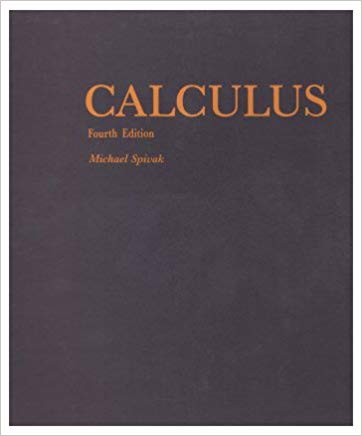
Spivak's Calculus is the among the best maths book I have ever worked through but don't be fooled by the name - this is an introductory book to real analysis and is very different from the Calculus books mentioned earlier which emphasize computation. The emphasis for this book is on building up the foundations step by step for single variable calculus (starting from the construction of real numbers). It is a wonderfully coherent and realized book and what's also great about it is once again the exercises complement and expand on the content so well. Speaking of the exercises, some are seriously hard. This book took me about 6 months to work through because at the time I was still committed to solving every single exercise on my own. I almost burned out and I discuss what I learned from that experience coming up.
斯皮瓦克的《微积分》是我读过的最好的数学书籍之一,但不要被它的名字所迷惑——这是一本介绍真实分析的入门书籍,与前面提到的强调计算的《微积分》大不相同。这本书的重点是建立基础一步一步的单变量微积分(从实数的构造开始)。这是一本非常连贯和实现的书,它的伟大之处还在于练习再次补充和扩展了内容。说到练习,有些真的很难。这本书花了我大约6个月的时间来完成,因为当时我仍然致力于自己解决每一个练习。我几乎精疲力尽,我讨论了我从即将到来的经历中学到的东西。
Everybody should own this book.
每个人都应该拥有这本书。
Calculus - Apostol
微积分-使徒
Spivak's book can be genuinely too hard for some people at this stage. For that reason, there are two other books I'm happy to recommend as alternatives.
斯皮瓦克的书在这个阶段对某些人来说真的太难了。出于这个原因,我很乐意推荐另外两本书作为替代品。
The first is Apostol's Calculus. Apostol proceeds at a more leisurely pace compared to Spivak, and is happy to spend time building up your intuition with examples and geometric arguments before diving in to more rigorous proofs. Interestingly enough, the book also goes a fairly long way in introducing linear algebra in the final few chapters. I do like as well that this book introduces integration before differentiation, which you'll know if you read through Kline's historical book, is more historically accurate.
第一个是阿波斯托尔的微积分。与斯皮瓦克相比,Apostol 的进展更为从容,并且乐于花时间用例子和几何论证来建立你的直觉,然后再进行更为严格的证明。有趣的是,这本书在最后几章引入线性代数方面也走了相当长的一段路。我也很喜欢这本书介绍了先整合后分化,如果你通读克莱恩的历史书,你会知道这本书更符合历史。
One thing to note is this book can be quite hard to find and unfortunately the edition I have has some weird print quality issues. Your mileage may vary.
值得注意的是这本书很难找到,不幸的是我的版本有一些奇怪的印刷质量问题。你的情况可能会有所不同。
Introduction to Analysis - Mattuck
分析导论-马塔克
The second introductory analysis book I'm happy to recommend is Mattuck's Introduction to Analysis. As with Spivak, this book mostly focuses on real-valued functions of a single variable and only in the last few chapters goes beyond. Mattuck makes clear in the introduction that this book was written for those struggling with analysis and less confident with proof techniques and I think it succeeds really well in what it set out to do. If you're struggling with Spivak, pick this book up.
我很高兴推荐的第二本分析入门书是马塔克的《分析入门》。和 Spivak 一样,这本书主要集中在单个变量的实值函数上,只在最后几章有所突破。马塔克在序言中明确表示,这本书是为那些挣扎在分析和证明技术不太自信的人而写的,我认为它真的很成功,在它开始做什么。如果你和斯皮瓦克纠缠不清,拿起这本书。
Linear Algebra
线性代数
For Linear Algebra, I can suggest two different learning paths. If you prefer to work through books only, I recommend working through Savov and Axler for both the applied and pure views of linear algebra. However, if you're comfortable with video instruction, I really like Gilbert Strang's Linear Algebra material (both the book and the online course).
对于线性代数,我可以提出两种不同的学习方法。如果您喜欢仅通过书本来完成工作,我建议您通过 Savov 和 Axler 来完成线性代数的应用视图和纯视图。然而,如果你对视频教学感到舒服,我真的很喜欢 Gilbert Strang 的线性代数教材(这本书和在线课程)。
Starting with Savov and Axler:
从 Savov 和 Axler 开始:
No bullshit guide to linear algebra - Savov
没有扯淡的线性代数指南-萨沃夫
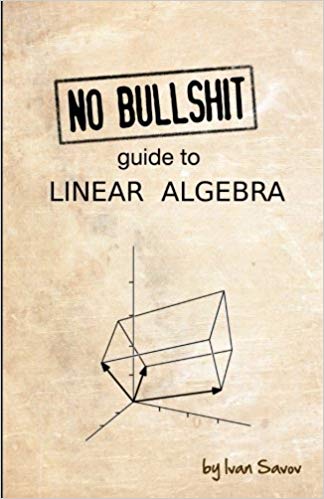
No bullshit guide to linear algebra is a book that has only come out quite recently, and it's a book I read only after already making my way through more advanced texts. That necessarily changes your perspective, but nonetheless I still think this is an excellent book for a first introduction to linear algebra. One quality of the book I really appreciated was the healthy coverage of applications in the final few chapters - looking at the application of linear algebra to problems in cryptography, fourier analysis, probability, etc.
没有扯淡的线性代数指南是一本最近才出版的书,它是一本我在读完更高级的课本后才读的书。这必然会改变你的观点,但尽管如此,我仍然认为这是一本优秀的书,首次介绍线性代数。我非常欣赏这本书的一个特点,就是在最后几章中对应用程序的健康覆盖——探讨线性代数在密码学、傅立叶变换家族中的关系、概率等问题中的应用。
Linear Algebra Done Right - Axler
线性代数做右边-Axler
Linear Algebra Done Right is a quite well known book, famous for its non-standard treatment of determinants, only really introducing them towards the end of the book. Incidentally, this is what the "Done Right" in the title refers to: Axler has a bone to pick with determinants and doesn't hide it. It's a pure-math proofs focused book with nothing in the way of applications, which is also why I suggest pairing this book with Savov's which is more applied/computational. The proofs in the book are excellent and are a model for clarity and simplicity - working through this book really helped me build up a strong foundational intuition for linear algebra. The book unfortunately does not come with solutions to the exercises, but many can be found online.
线性代数“做对了”是一本相当有名的书,因其对行列式的非标准处理而闻名,只是在书的最后才真正介绍了它们。顺便说一下,这就是标题中的“完成正确”所指的: Axler 有一根骨头要用行列式挑剔,而且不会隐藏它。这是一本纯数学证明的书,没有任何应用,这也是为什么我建议将这本书与 Savov 的更加应用/计算的书结合起来。这本书中的证明非常出色,是清晰和简单的典范——通过阅读这本书,真正帮助我建立了强大的线性代数的基础直觉。不幸的是,这本书并没有提供练习的解决方案,但是很多都可以在网上找到。
Introduction to Linear Algebra and MIT OCW Linear Algebra - Strang
线性代数导论与 MIT 线性代数-Strang
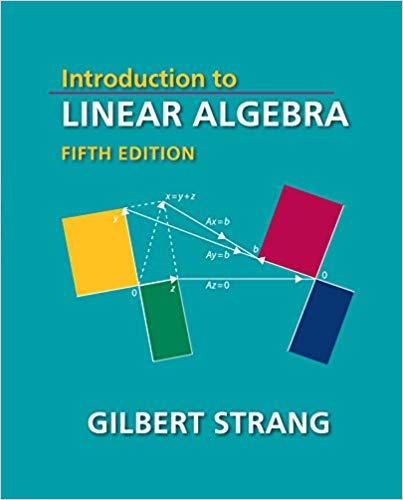
Here I treat both the book and the course as one, because they complement each other so well. What that does mean however is that you'll often find yourself jumping back and forwards between the book and the videos - for some people that's going to be a plus and enhance the learning experience (in many ways, it's much like it would be if you attended MIT in person) while for others that's a big detracting point. I'll leave it for you to decide which is best for you. In terms of the material, the focus is mostly on the applied side of things but still managing to touch on the theory in places. The exercises are quite good, plus you also get access to the MIT exams (with solutions).
在这里,我把书和课程视为一体,因为它们相辅相成。然而,这意味着你经常会发现自己在书和视频之间来回跳跃——对于一些人来说,这将是一个加分,增强学习经验(在很多方面,这很像你亲自上麻省理工学院) ,而对于其他人来说,这是一个很大的转移点。我会让你自己决定哪个对你最好。就材料而言,焦点主要集中在事物的应用方面,但仍设法在某些地方触及理论。这些练习相当不错,而且你还可以参加麻省理工学院的考试(附有答案)。
Coding the Matrix: Linear Algebra through Applications to Computer Science - Klein
矩阵编码: 线性代数在计算机科学中的应用
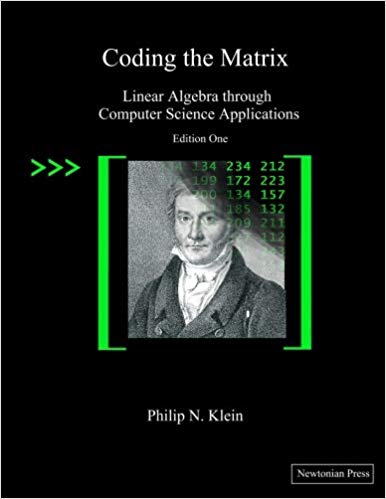
If you're a software developer like me, I wholeheartedly recommend that you pick up Coding the Matrix. I originally learned about this book through a course on Coursera but never took the online course and instead went straight for the book. The emphasis of the book is on programming (with Python), applying techniques from linear algebra to applied problems such as compression, image manipulation, machine learning, etc. It's the kind of book that I think works best if you've already had some introduction to linear algebra by working through any of the above above recommended books, giving your theoretical foundations a really strong applied grounding.
如果你是一个像我一样的软件开发人员,我衷心建议你学习编码矩阵。我最初是通过 Coursera 上的一门课程了解这本书的,但我从来没有上过在线课程,而是直接去看这本书。本书的重点是编程(使用 Python) ,将线性代数的技术应用于应用问题,如压缩、图像处理、机器学习等。如果你已经通过阅读上述推荐书籍中的任何一本对线性代数有了一些介绍,并且给你的理论基础一个真正强大的应用基础,那么我认为这是一本最好的书。
A brief interlude to talk about study, exercises, and taming the completionist inside you
一个简短的插曲来谈论学习,练习,和驯服你内心的完美主义者
Ok, let me take a moment to share some hard-won advice. When it comes to solving exercises as you work through these books, the completionist mindset will destroy you. When I first set out on my adventure, I would refuse to move forward in a book until I had solved every problem. This worked up to a point...and that point was when I met Spivak and had to finally concede defeat.
好吧,让我花点时间来分享一些来之不易的建议。当你在阅读这些书籍的同时解决练习题时,完美主义的心态会毁了你。当我第一次开始我的冒险时,我会拒绝在一本书中向前推进,直到我解决了所有的问题。事情发展到一定程度,那一刻我遇到了斯皮瓦克,最终不得不承认失败。
It's hard to put a formal rule on how long you should spend on any given exercise before "giving up" and looking at the solution. I would say a lower bound should be maybe 20 minutes or so. But the upper bound? I don't know. For some problems, it can be fruitful and productive to spend days (weeks even?) thinking about them provided you're making some kind of incremental progress or still have tricks in your bag you want to apply.
在“放弃”和寻找解决方案之前,很难对你应该花多长时间在任何给定的练习上制定一个正式的规则。我认为下限应该是20分钟左右。但是上限呢?我不知道。对于一些问题,花上几天(甚至几周?)是富有成效的如果你正在取得某种渐进的进步,或者你的包里仍然有你想要应用的技巧,那么就考虑一下它们。
For me personally, I spend around 10 hours most weeks doing math and I've had brief bursts where I've done as much as 30hrs/week when I'm between contracts, etc. What that does mean though is that one hard exercise can completely block your progress for weeks if you let it, and I'll say right now, when that does happen, it can be quite demoralizing.
就我个人而言,大多数时候,我每周花10个小时做数学题,在合同到期的时候,我每周花30个小时做数学题,等等。这意味着,如果你任由一项艰苦的训练阻碍你的进步,那么它可能会阻碍你几个星期,我现在就要说,当这种情况真的发生时,它可能会非常令人沮丧。
Ultimately, my advice is to let your intuition and energy levels guide you - do you have the energy to chase this really hard problem down or are you in the mood for just learning the answer now? If you just want the answer now so you can move forward, look it up! There's no penalties here. You didn't lose.
最后,我的建议是让你的直觉和能量水平来引导你——你有精力去解决这个真正难的问题吗? 还是你现在就有心情去学习答案?如果你现在只是想知道答案,然后继续前进,那就去查吧!这里没有惩罚。你没有输。
I know it feels unnatural to not set hard rules around how long you should spend on a given problem, but remember that ultimately you're optimizing for your enjoyment (that's why you're doing this, right?) and long term consistency.
我知道对于一个问题你应该花费多长时间不设定硬性规则是不自然的,但是请记住,最终你是为了你的享受而优化的(这就是为什么你要这样做,对吗?)和长期的一致性。
You will do yourself a disservice (in maths, and in life) if you burn out hot and fast.
如果你又热又快地精疲力竭,你会对自己(在数学和生活中)有害无益。
Multivariable Calculus
多元微积分
MIT OCW Multivariable Calculus
麻省理工开放式课程多元微积分
The MIT OCW Multivariable Calculus course is the best resource I've found for getting comfortable with multivariable calculus. I don't really know of any good books covering this subject (no, please don't say Stewart) and I found the MIT course to be really enjoyable. Good collection of problems and worked solutions, clear material and lectures. And if I'm honest, as a self-learner who went to a good but not great university, there is also something quite satisfying about "sitting" an exam from MIT in the same conditions as an MIT student would experience and completely acing the exam.
麻省理工学院开放式课程多元微积分是我找到的最好的资源,可以帮助你更好地适应多元微积分。我真的不知道任何好书涵盖这个主题(不,请不要说斯图尔特) ,我发现麻省理工学院的课程是真正令人愉快的。良好的问题和解决方案的收集,清晰的材料和讲座。老实说,作为一个自学者,上的是一所好大学但不是很好的大学,“坐”在麻省理工学院的考试环境中,就像一个麻省理工学院的学生所经历的那样,并且在考试中取得优异的成绩,这也是一件很令人满意的事情。
Differential Equations
微分方程
Ordinary Differential Equations (Dover) - Tenenbaum and Pollard
常微分方程(Dover)-Tenenbaum 和 Pollard
ODEs get a bit of a bad rap for being a quite boring subject, and I think many people view the process of learning about differential equations as being about internalizing an almost random collection of "tricks" to solve certain ODE forms. But it doesn't have to be that way, and I learned that from working through this book. While this book leans heavily into the applied/computational side of mathematics, it also does a great job complementing the examples and exercises with theory. It does feel a bit dated at times (it was written in 1985) and could probably benefit in certain places with some visual aids, but if you're comfortable with Python and plotting/graphical libraries you can make it up yourself as you go along. Overall, the book moves along at a fairly gentle pace - you're unlikely to get stuck as you work through the book as long as you're diligent, all the exercises have solutions, and being a Dover book, it's really cheap!
常微分方程是一门相当枯燥的学科,因此得到了一点坏名声,我认为许多人认为学习微分方程的过程是内化一系列几乎随机的“技巧”来解决某些常微分方程的形式。但不一定非要这样,我从这本书中学到了这一点。虽然这本书严重倾向于数学的应用/计算方面,它也做了很大的工作补充的例子和理论练习。它有时确实感觉有点过时(它写于1985年) ,可能在某些地方有一些可视化的帮助,但如果你对 Python 和绘图/图形库感到舒服,你可以自己编写。总的来说,这本书以一个相当温和的步伐前进——只要你勤奋,所有的练习都有解决方案,你不太可能在阅读这本书的过程中卡住,而且作为一本多佛书,它真的很便宜!
Analysis
分析
Principles of Mathematical Analysis - Rudin
数学分析原理-鲁丁
Rudin's Principles of Mathematical Analysis, also affectionately known as Baby Rudin, is a difficult, serious book but if you made your way through Spivak and all the books I've shared so far, you've got all the tools you need to succeed to make it through this. Occasionally you'll see this recommended as the first book people should learn analysis from, but I think that's a big mistake for us self-learners: it's dry, contains little in the way of motivation/exposition and has quite a few "fill in the blanks" moments.
鲁丁的数学分析原理,也被亲切地称为婴儿鲁丁,是一本困难的,严肃的书,但如果你通过斯皮瓦克和所有的书,我分享到目前为止,你有所有的工具,你需要成功地通过这一点。有时你会看到这本书被推荐为人们应该学习分析的第一本书,但是我认为这对于我们自学者来说是一个大错误: 它干巴巴的,没有什么动机/说明,而且有很多“填补空白”的时刻。
Note that although this book does not have any official solutions, there is a reddit community that has been working through the book, crowd-sourcing and documenting solutions. The community is at https://www.reddit.com/r/babyrudin/ and the crowd-sourced solutions document can be found here.
请注意,虽然这本书没有任何正式的解决方案,但有一个 Reddit 社区一直在通过这本书,众包和文档解决方案。社区正处于 https://www.reddit.com/r/babyrudin/ ,可以在这里找到众包解决方案文件。
Algebra
代数
A Book of Abstract Algebra (Dover) - Pinter
抽象代数(多佛)-品特
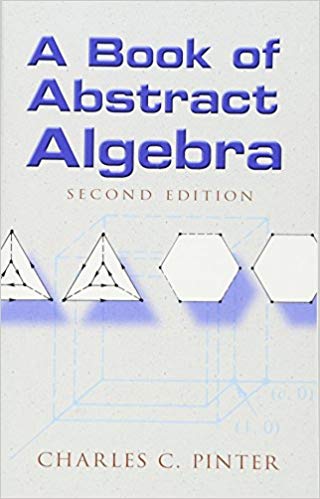
I'm really excited to recommend Pinter's A Book of Abstract Algebra and the truth is if the subject of Abstract Algebra is of real interest to you, this is the kind of book you can pick up and work through very early on - as early as after finishing your first book of proofs (and if you're clever, even before that). The chapters are quite short, with each chapter accompanied by a pretty hefty set of exercises which expand on the content. The book covers all the usual suspects: groups, rings, etc. and ultimately builds its way up to Galois Theory. One important thing to note is the book only contains solutions to selected exercises but the exercises are not too hard, so this shouldn't be too much of a problem.
我真的很高兴向你推荐品特的《抽象代数》 ,事实上,如果你真的对抽象代数感兴趣的话,这是一本你可以很早就开始阅读的书——在你完成你的第一本证明书之后(如果你很聪明,甚至在那之前)。这些章节非常短,每一章都伴随着大量的练习,这些练习扩展了内容。这本书涵盖了所有常见的怀疑: 群,环,等等,并最终建立了它的方式伽罗瓦理论。一个重要的事情要注意的是,这本书只包含选定的练习的解决方案,但练习并不太难,所以这应该不是一个太大的问题。
One funny sidenote: I've heard it said on many occasions that mathematicians typically fall into one of two camps: those who like algebra (algebraists), and those who like analysis (analysts). It's even been observed that analysts tend to eat corn in spirals, while algebraists in rows. After now getting your first taste of algebra, which camp do you think you're in and does the corn theory hold true?
一个有趣的旁注: 我在很多场合听说数学家通常分为两个阵营: 喜欢代数的(代数学家)和喜欢分析的(分析家)。甚至有人观察到,分析师倾向于吃螺旋形的玉米,而代数学家则倾向于吃成排的玉米。在你第一次尝到代数的滋味之后,你认为你属于哪个阵营,玉米理论是否成立?
Abstract Algebra - Dummit and Foote
抽象代数
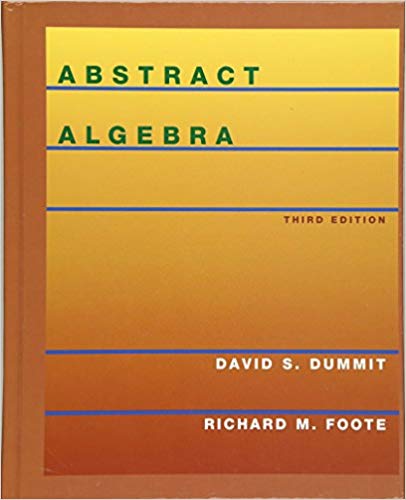
While Pinter's A Book of Abstract Algebra is excellent, it only covers a small sliver of topics from the field of abstract algebra. By contrast, Abstract Algebra is massive, and covers a lot of ground. You could almost affectionately call it a reference, but at the same time it also has a lot of those same qualities that make it excellent for self-study - lots of examples and exercises, good motivation and descriptions, etc. Just a note though that it does not come with solutions to the exercises, but given its popularity, it's quite easy to find them online.
尽管品特的《抽象代数》非常优秀,但它只涵盖了抽象代数领域的一小部分主题。相比之下,抽象代数是巨大的,覆盖了大量的土地。你几乎可以亲切地称它为参考,但同时它也有很多相同的品质,使它成为优秀的自学-大量的例子和练习,良好的动机和描述,等等。不过需要注意的是,它并没有提供练习的解决方案,但考虑到它的流行程度,在网上很容易找到它们。
To reiterate, this is a big book and I haven't myself worked my way through it entirely, but rather just picked it up now and then and absorbed small bits and pieces at a time...in many ways treating it like a reference instead of something to work through from start to finish.
重申一下,这是一本很大的书,我自己并没有完全读完它,而只是偶尔拿起它,一次吸收一点点... ... 在很多方面把它当作一个参考,而不是从头读到尾。
If you can, buy the hardcover. Books this big don't fare as well as paperback.
如果可以的话,买精装本。这么大的书不如平装本好。
Topology
拓扑
Topology - Munkres
拓扑学-Munkres
Focusing on point set Topology, Munkres' Topology is widely considered to be one of the best introductory books in the field. Topology is a quite difficult subject to grasp and it took me several attempts to get going - I admit to feeling much like Hitler in Hitler learns topology for a very long time until finally things started to click. Part 2 of the book contains a nice introduction to algebraic topology but I'll admit now at the time I got to this material I was already struggling a bit and have never revisited the material.
蒙克雷斯的《拓扑学》以点集拓扑学为主要研究对象,被广泛认为是该领域最好的入门书籍之一。拓扑学是一门很难掌握的学科,我花了好几次尝试才开始学习——我承认,我感觉自己就像希特勒里的希特勒一样,花了很长时间学习拓扑学,直到事情终于开始明朗起来。这本书的第二部分包含了一个很好的代数拓扑介绍,但是我现在承认,当我读到这些材料的时候,我已经有点纠结了,而且从来没有重新阅读过这些材料。
Introduction to Topology (Dover) - Mendelson
拓扑学导论(多佛)-门德尔松
This was the book that really helped me get Topology. If you're finding Munkres a bit difficult to get going, this book is both cheaper and has a bit more exposition - there's a lot more hand-holding and the book takes its time to help you build up the intuition for why things work. In my opinion, this is the better book of the two for self-learners.
这本书真正帮助我得到拓扑学。如果你觉得 Munkres 有点难以理解,这本书既便宜又有更多的解释——有更多的手把手的东西,这本书需要时间来帮助你建立为什么事情运作的直觉。在我看来,这本书对于自学者来说是两本书中较好的一本。
Number Theory
数论
Elementary Number Theory - Jones
初等数论-琼斯
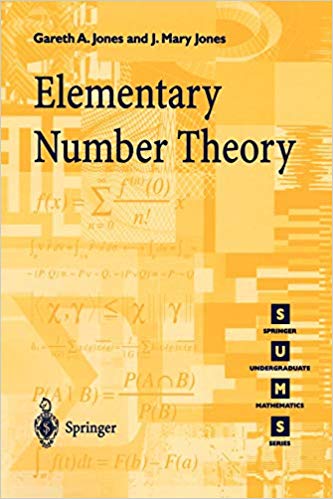
Elementary Number Theory is a great book for anyone who wants to jump in to number theory first and may have skipped some of the previously mentioned books on algebra, as it assumes very little prior knowledge. This was certainly the case for me, where I worked through this book shortly after my first proofs book. In terms of difficulty, it was perfect for me at the time, but on reflection now it might be too easy for some. If that's the case, take a look at An Introduction to the Theory of Numbers which I think would be the next best step up in difficulty and maturity.
初等数论是一本很好的书,任何人谁想跳到数论第一,可能已经跳过了一些前面提到的代数书籍,因为它假设很少的先验知识。这当然是我的情况,我通过这本书后不久,我的第一个校对书。就困难程度而言,当时对我来说是完美的,但是现在回想起来,对某些人来说可能太容易了。如果是这样的话,看一下《数论导论》 ,我认为这是在难度和成熟度方面的下一个最好的进步。
Number Theory (Dover) - Andrews
数论(多佛)-安德鲁斯

George Andrews is one of the leading experts in the field of partitions and this book provides an excellent first introduction to the field along with a good selection of other topics (with a combinatorial focus). It's quite a short book, but manages to pack a lot in and has a great selection of exercises (with solutions to selected exercises). If you've ever heard the "Rogers-Ramanujan identities" and wanted to learn more, this book is the perfect study companion.
George Andrews 是分区领域的领先专家之一,这本书提供了该领域的优秀的第一次介绍,以及其他主题的精选(以组合为焦点)。这是一本相当短的书,但设法打包了很多,并有一个伟大的选择练习(与选定的练习的解决方案)。如果你曾经听说过“罗杰斯-拉马努詹身份”,并想了解更多,这本书是完美的学习伙伴。
Probability
概率
Introduction to Probability, Statistics, and Random Processes - Pishro-Nik
概率、统计学和随机过程导论-Pishro-Nik
While focusing more on the applied side of probability and statistics (this book doesn't go anywhere near measure theory), this book ended up being a really pleasant surprise for me in a field that I wasn't particularly interested in and have always found a bit dry. It also doesn't really assume much in the way of prior knowledge except for a little multivariable calculus and linear algebra, making it very approachable. I think engineers working in the fields of machine learning and data science in particular would really benefit from working through this book.
虽然更多地关注概率和统计学的应用方面(这本书没有任何地方接近测量理论) ,这本书最终成为一个真正令人愉快的惊喜,在一个领域,我不是特别感兴趣,总是发现有点枯燥。除了一些多元微积分和线性代数,它也没有太多先验知识的假设,这使得它非常容易理解。我认为在机器学习和数据科学领域工作的工程师会从这本书中受益匪浅。
Other
其他
What follows is a collection of books and resources I also highly recommend, but somewhat off the beaten path and chosen by me more for personal interest.
下面是我强烈推荐的一些书籍和资源的集合,但是这些书籍和资源有些偏离常规,我选择它们更多是出于个人兴趣。
What Is Mathematics? - Courant and Robbins
什么是数学?-Courant 和 Robbins
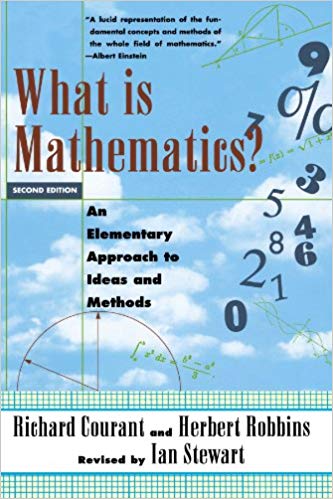
What Is Mathematics is a classic and it's one that I thoroughly enjoyed reading...eventually. Why eventually? While it's claimed to be an "elementary" book for the "beginner", in truth, if you gave this book to any but the most gifted high-school graduate it would absolutely crush them within the first ~20 pages. And such was the case with me, where I picked this book up and tried to work through it very early on in my learning journey. Unless you're brilliant (and I surely am not), I really would recommend only tackling this book after working through a proofs book and some of the foundation books I recommended earlier. The book itself is quite broad in the subject matter it covers - number theory, geometric constructions, projective geometry, topology, and finally on to calculus. It's actually a really playful and fun book and manages really well to avoid getting bogged down too much in any one area. I highly recommend it...just make sure you don't start it before you're ready.
《什么是数学》是一本经典著作,而且是我最终非常喜欢阅读的一本书。为什么?虽然这本书号称是“初学者”的“基础”书籍,但事实上,如果你把这本书给除了最有天赋的高中毕业生以外的任何一个人,它绝对会在前20页就把他们压垮。这就是我的情况,我拿起这本书,并试图通过它在我的学习旅程非常早期。除非你很聪明(我肯定不是) ,否则我真的建议你在阅读完一本校样书和我之前推荐的一些基础书籍后再读这本书。这本书涵盖的主题相当广泛——数论、几何构造、射影几何、拓扑学,最后是微积分。这实际上是一本非常好玩和有趣的书,它很好地避免了在任何一个领域陷入太多的困境。我强烈推荐... ... 只是要确保你在准备好之前不要开始。
Naive Set Theory (Dover) - Halmos
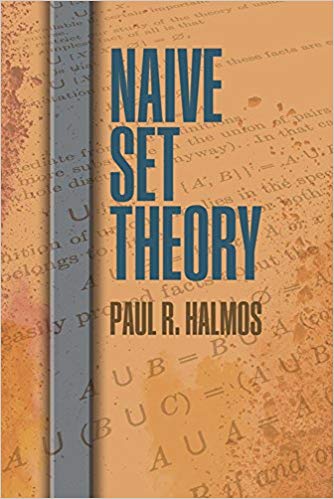
Naive Set Theory gets right to the heart of the set-theoretic underpinnings of mathematics and does it extremely well. It is an extremely readable book, and in my opinion Halmos was one of the best mathematical expositors ever (interesting aside: Halmos invented the "iff" notation for that wonderful phrase "if and only if" and also the ∎ notation to signify the end of a proof!). It contains only a small handful of exercises. This book was my first exposure to proper set theory and I really enjoyed it.
朴素集合论直指数学的集合论基础的核心,而且做得非常好。这是一本极具可读性的书,在我看来,哈尔莫斯是有史以来最好的数学解说家之一(有趣的是: 哈尔莫斯发明了“ if”符号,用来表示奇妙的短语“ if and only if”,也发明了“ something”符号来表示证明的结束.它只包含一小部分练习。这本书是我第一次接触正确的集合论,我真的很喜欢它。
The Cauchy-Schwarz Master Class - Steele
Cauchy-Schwarz 大师级 Steele
You can almost think of The Cauchy-Schwarz Master Class as an exercises/problem solving book for inequalities...as I worked through it I couldn't help but think this book would basically be the perfect bootcamp for dealing with tricky inequalities in a competitive math setting. It's got that quality of books like Polya's How to Solve It and others in that its always prodding you to think creatively and work the problems. And working through it, you also come to appreciate just how damn versatile the Cauchy-Schwarz inequality is!
你几乎可以把《柯西-施瓦茨大师班》想象成一本关于不等式的练习/问题解决的书... ... 当我读完它的时候,我不禁想到,这本书基本上可以成为在竞争激烈的数学环境中处理棘手的不等式的完美训练营。它有像波利亚的《如何解决问题》和其他书的质量,因为它总是激励你创造性地思考和解决问题。通过这种努力,你也会逐渐意识到 Cauchy-Schwarz 的不平等是多么的多才多艺!
Prime Numbers and the Riemann Hypothesis - Mazur and Stein
I'm currently reading this book right now!
我现在正在读这本书!
Connecting with the broader math community
联系更广泛的数学社区
At least for me, studying mathematics has been a fairly isolated experience and I've never really found a good community to participate in. There are a couple of communities I'm aware of though, and of these, /r/math and the AoPS Community seem to be the most active. There's also the Math StackExchange, which is very active, but I find it hard to classify that as a community.
至少对我来说,学习数学是一种相当孤立的经历,我从来没有真正找到一个好的社区参与其中。不过,我知道有几个社区,其中/r/數学社区和 AoPS 社区似乎是最活跃的。还有数学堆栈交换(Math StackExchange) ,它非常活跃,但我发现很难将其归类为一个社区。
I also really like Grant Sanderson's 3Blue1Brown YouTube Channel - he has a lot of excellent general interest math videos with just the right amount of rigor.
我也非常喜欢 Grant Sanderson 的3Blue1Brown YouTube 频道——他有很多非常棒的大众数学视频,而且都很严谨。
What's next
接下来是什么
There's a couple of books I've heard great things about that I'm really interested in reading next. They are (in no specific order):
有几本书我听说了很多很棒的东西,接下来我真的很想读一读。它们是(没有特定的顺序) :
Mathematics: Its Content, Methods and Meaning - I actually own the Kindle edition of this but as with many math books, it has not been converted to digital format well. I'm really looking forward to picking up the print copy and having a go at this.
数学: 它的内容,方法和意义-我实际上拥有这本书的 Kindle 版本,但是和许多数学书一样,它还没有被很好地转换成数字格式。我真的很期待拿到打印稿然后试试这个。
Visual Complex Analysis - Some chapters in the TOC look quite familiar to me, and others I have no idea about...which is quite exciting!
视觉复杂分析-在 TOC 的一些章节看起来很熟悉,对我来说,和其他我不知道... 这是相当令人兴奋的!
Introductory Functional Analysis with Applications - I've heard this is one of the best introductory books for functional analysis.
应用功能分析入门-我听说这是功能分析最好的入门书籍之一。
Some parting advice
临别时的建议
I'm currently 35 years old, and while studying mathematics have had two wonderful kids and co-founded a startup. Suffice to say, life has been busy. So I wanted to offer some more general advice for anyone who also wants to study math while also staying sane. Here is what has helped me:
我现在35岁,在学习数学的同时,我有两个非常棒的孩子,并与他人共同创办了一家初创公司。可以说,生活一直很忙碌。所以我想为那些既想学习数学又想保持理智的人提供一些更为普遍的建议。以下是对我有所帮助的:
-
Exercise. It turns out that you're not just a brain in a tank and the mind-body connection has an immense impact on your daily happiness and well-being. Exercise every day.
运动。事实证明,你不仅仅是水箱里的一个大脑,身心联系对你的日常快乐和幸福有着巨大的影响。每天锻炼。
-
Take regular breaks and go for walks. Seemingly intractable problems have a surprising way becoming tractable after a long walk. Sunshine also has a wonderful effect on improving your overall mood and helping you sleep better.
定期休息和散步。看似棘手的问题,经过长途跋涉后,有一种令人惊讶的变得易于处理的方式。阳光对于改善你的整体情绪和帮助你更好的睡眠也有很好的效果。
-
Alternate between easier and harder content. One way you're sure to burn out is if you are always pushing, without periods of rest. Make sure you follow up hard books with easier, almost routine, books. Sometimes it can even be beneficial to work on two books at once - one easy, one hard. Make sure to pepper in little easy wins everywhere in between the big meaty hard problems. Always follow up "failure" (ie. this problem is too hard, I give up) with "success".
在更容易和更难的内容之间切换。有一种方法你肯定会筋疲力尽,那就是如果你总是在推挤,而且没有休息的时间。确保你用更容易的,几乎是例行公事的方法来跟进实用的书籍。有时候一次写两本书也是有好处的——一本容易,一本难。确保胡椒粉在小容易赢得任何地方之间的大肉的困难问题。总是跟进“失败”(例如:。这个问题太难了,我放弃了)与“成功”。
-
Spend time with friends and family. Self-studying maths can be a bit isolating, but ultimately we're wired to be social creatures. Don't neglect your friends and family. Invest in good relationships with people you love to be around.
花时间与朋友和家人在一起。自学数学可能有点孤立,但归根结底,我们天生就是社会动物。不要忽视你的朋友和家人。与你喜欢的人建立良好的人际关系。
























 被折叠的 条评论
为什么被折叠?
被折叠的 条评论
为什么被折叠?








